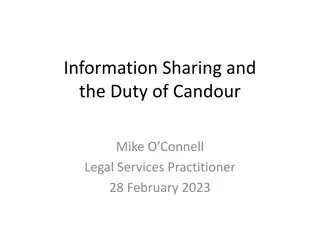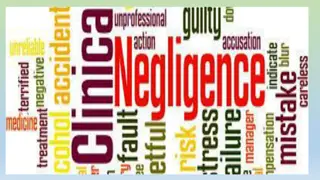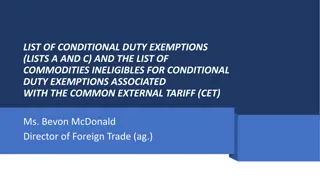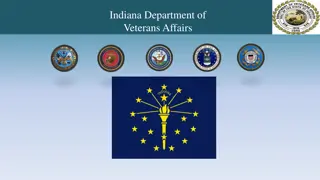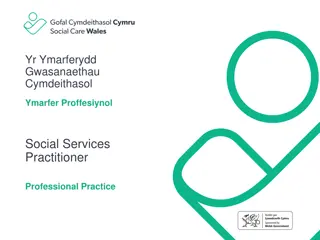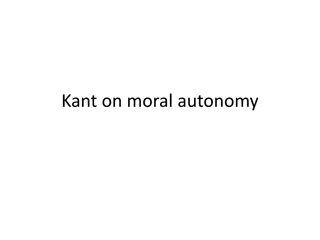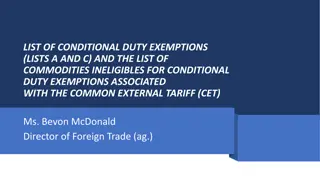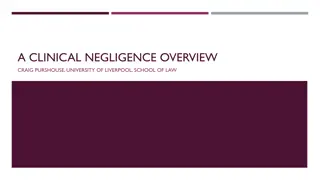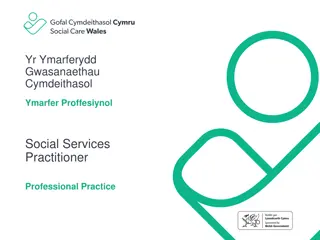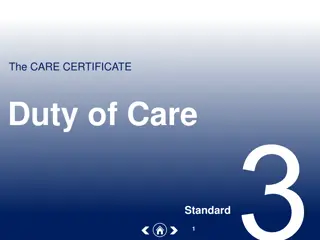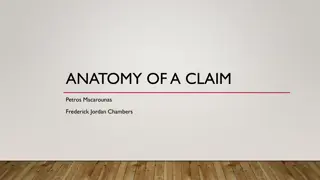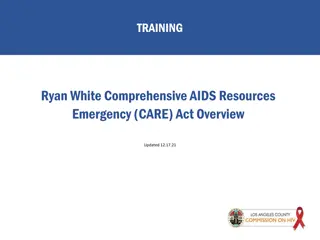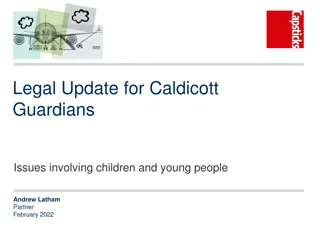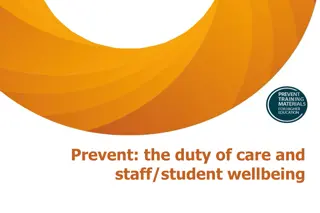Understanding the Duty of Candour in Health and Social Care Act 2020
The Health and Social Care (Quality and Engagement) (Wales) Act 2020 introduced the duty of candour for NHS bodies in Wales, outlining legal obligations in reporting and taking appropriate action when harm occurs to patients. This Act covers areas such as duty of quality, duty of candour, establishment of Citizen Voice Body, and more. The duty of candour applies to various NHS bodies in Wales, requiring them to follow specific procedures and publish reports annually. Triggering the duty of candour occurs when unexpected harm is suffered, and healthcare provision is implicated. Understanding this duty is crucial for maintaining a safe care environment for patients.
Uploaded on Sep 19, 2024 | 0 Views
Download Presentation

Please find below an Image/Link to download the presentation.
The content on the website is provided AS IS for your information and personal use only. It may not be sold, licensed, or shared on other websites without obtaining consent from the author. Download presentation by click this link. If you encounter any issues during the download, it is possible that the publisher has removed the file from their server.
E N D
Presentation Transcript
WELCOME TO THE WEBINAR
The Health and Social Care (Quality and Engagement) (Wales) Act 2020 Duty of Candour
Learning Objectives Domain: Professionalism Standard of Practice 11 To understand your legal obligations in reporting if patients are at risk or have suffered harm and to put the matter right if that is possible and/or raise a concern. Domain: Leadership and accountability Standard of Practice 12 To understand the reporting framework around Duty of Candour in Wales and how to take appropriate action when incidents are to be reported to ensure that a safe environment is provided to deliver care to your patients.
Content of the Act The Act covers four principal areas: Duty of Quality on NHS bodies Duty of Candour on NHS bodies and primary care Establishment of a new Citizen Voice Body for Health and Social Care Provision for statutory Vice Chairs of NHS Trusts The Act was passed by the Senedd on 17 March 2020 and received Royal Assent on 1 June 2020. The Act came into force in April 2023.
Who does the Duty of Candour apply to? The duty of candour applies to the following NHS bodies : Local Health Boards; Primary Care providers in Wales; NHS Trusts in Wales; Welsh Special Health Authorities, and NHS Blood and Transplant in relation to the functions it exercises in relation to Wales.
Duty of Candour What does it mean? NHS bodies need to follow a set procedure when the duty is triggered. This is set out in Regulations. LHBs and NHS Trusts must publish a candour report after the end of each financial year.
When does the Duty of Candour procedure apply? In practice, the duty of candour is triggered if unexpected or unintended harm that is moderate and above is suffered or may be suffered (referred to as adverse outcome) & the provision of healthcare was (or may have been) a factor in the service user suffering that adverse outcome.
Levels of harm Moderate - A service user experiences a moderate increase in treatment and significant but not permanent harm and the care provided by the NHS did or may have contributed. For example, they are given medication despite this being documented in their notes as an allergy, and this leads to a significant reaction requiring four or more days in hospital before recovery. Severe - A service user experiences a permanent disability or loss of function and the NHS care did or may have contributed. For example, they are given medication despite this being documented in their notes as an allergy, and this leads to brain damage or other permanent organ damage. Death - A service user dies and the NHS care did or may have contributed to the death. For example, they are given medication despite this being documented in their notes as an allergy, and this leads to their death.
Duty of Candour Procedure
Reporting requirements NHS bodies will be required to report annually and publish their reports. When reporting, NHS bodies will be required to specify if the duty of candour has been triggered in the reporting year and if it has: state how often the duty of candour has been triggered during the reporting year; give a brief description of the circumstances in which the duty was triggered; and specify any steps taken by the body with a view to preventing similar circumstances from arising in the future. Primary Care providers must provide candour reports to the Health Board with whom they enter into a contract or arrangements for services. Health Board s must include a summary of the Primary Care reports in their published report.
Primary Care dedicated website for reporting incidents https://nwssp.nhs.wales/a-wp/pcir/
1: Medication Wrong regimen advised Incorrect contact lens solution Incorrect diagnostic drops used e.g. Tropicamide instead of Oxybuprocaine
2: Clinical Intervention Non-referral when intended to refer Not reviewing test results Missed pathology Patient not followed up
3: Communication Referral letter not sent Referring through wrong route Dispensing errors due to poor communication Fax problems e.g. not received Triage not shown to Optometrist/Contact Lens Optician in a timely manner
4: Equipment Calibration of equipment not completed Appropriate equipment not available Lack of training on how to use equipment Lack of training on interpretation of e.g. OCT Fax machine not working
5: Administration Patient lost to follow up Erroneous discharge Wrong GP surgery on patient record Receptionist providing unchecked prescriptions Delayed appointments Inaccurate/inappropriate recall process
Case Study 1 What? Patient has slipped in reception and required hospital admission and operation for broken arm Where? Optometry practice Why? Puddle of water in reception Action? Practice arranged ambulance for patient Harm? Moderate harm
Case Study 2 What? Patient attends for sight test. Seen by Ophthalmology for wet AMD injections 6 months ago. Hasn t been seen since and vision is worse. VA has dropped from 6/12 to 6/60. Where? Ophthalmology Why? Patient not received clinic letter? Action? Optometry practice contacts Ophthalmology and arranges appointment Harm? Severe harm
Case study 3 What? Patient diagnosed with retinal tear at Optometry practice. Referral not arranged. Patient presents again 2 weeks later with macula off retinal detachment Where? Optometry practice Why? Miscommunication between practitioner and reception staff? Action? Patient referred to Eye Casualty Harm? Moderate/Severe harm
Case study 4 What? Pre-registration Optometrist performs contact tonometry and abrades cornea Where? Optometry practice Why? Inexperienced in technique? Action? Requires artificial tears and follow up visit Harm? Low harm
Case study 5 What? Patient asked to return for repeat visual fields by Optometrist. Test repeated but not shared with Optometrist and referral not made. Patient presents 1 year later for sight test with advanced field loss Where? Optometry practice Why? Miscommunication between practitioner and reception staff/lack of follow up process? Action? Patient referred to HES Harm? Severe harm
GOC Standards of Practice Be candid when things have gone wrong 19.1 Be open and honest with your patients when you have identified that things have gone wrong with their treatment or care which has resulted in them suffering harm or distress or where there may be implications for future patient care. You must: 19.1.1 Tell the patient or, where appropriate, the patient s advocate, carer or family that something has gone wrong. 19.1.2 Offer an apology. 19.1.3 Offer appropriate remedy or support to put matters right (if possible). 19.1.4 Explain fully and promptly what has happened and the likely short-term and long-term effects.
Next steps and Contacts OW to circulate: Health Boards contacts Online reporting link and further information Other Contacts: Optometry Wales Debbie.O'Sullivan@Optometrywales.com The Association of Optometrists Association of Optometrists (AOP) - Homepage The Federation of Ophthalmic and Dispensing Opticians: FODO | Home The Association of British Dispensing Opticians Association of British Dispensing Opticians - ABDO


